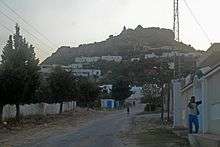Takrouna
Takrouna is a small village in the Sahel region of Tunisia. It stands on a hill at approximately 200 metres above sea level, overlooking the Gulf of Hammamet, Hergla and Sousse to the east, Djebel Zaghouan to the north, and the Kairouan plain to the south.

History
The name Takrouna is believed to have originated from a tribe that immigrated to Andalusia in the 8th century. Following the expulsion of the Moors in 1609, the descendants of these immigrants settled on the hill that the village now occupies.
Takrouna was the site of the last major action by New Zealand troops in North Africa during World War II, before the surrender of Italy and Germany.[1] Following the Battle of the Mareth Line (16-31 March 1943), Axis forces were driven back into Tunisia. On 19 April New Zealand forces prepared for an assault on Takrouna, then held by one Italian battalion and one German platoon. At dawn on 20 April, Lance-sergeant Haane Te Rauawa Manahi led a platoon on an attack up the hill, and successfully overran the Italian defenses. Manahi then left to locate reinforcements, returning with a section of C Company and another platoon, successfully resisting an Axis counterattack. Manahi and his section descended from the hill, but despite the reinforcements the New Zealand forces lost the hill to a second Axis counterattack on 21 April. Manahi returned in the afternoon and, with artillery support, retook first the ledge and then the village on the summit, taking 300 prisoners. Over 550 New Zealanders lost their lives in the battle.[2]
Demographics
Six families of Berber origin live in the village with one family of Andalusian descent.[3]
Economy
The inhabitants practice agriculture and weaving of alfa and Berber carpets
Popular culture
Takrouna was the location of the film Sabra and the Monster from the Forest by Habib Mselmani. The painter Ali Bellagha also contributed to the construction of the museum Dar Gmach.
References
- "Tunisia and Victory". nzhistory.govt.nz. Ministry for Culture and Heritage. Retrieved 11 January 2017.
- "Summit Takrouna". nzhistory.govt.nz. Retrieved 4 January 2017.
- webmanagercenter.com. "Aida Bellagaha Gmach: "Le Rocher bleu est un défi. Mon combat est de préserver notre patrimoine" | Webmanagercenter". webmanagercenter.com. Retrieved 2016-12-12.